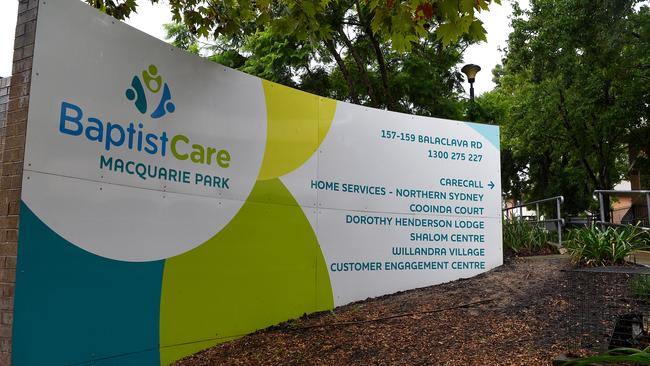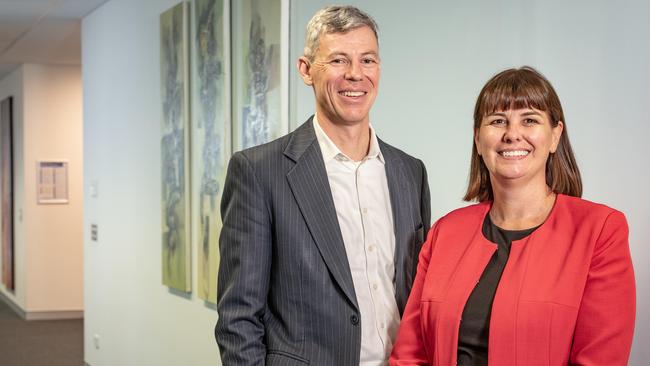BaptistCare launches the biggest aged-care sector merger of the year so far
The independently run WA and NSW/ACT companies operating under the BaptistCare brand are being merged into a single entity expected to generate $520m a year.

BaptistCare will combine its east and west coast arms in one of the biggest aged-care meters of the year as the sector consolidates to turn around its flagging fortunes and provide better care.
BaptistCare, a not-for-profit aged-care provider, will unite its NSW and ACT branch with its separately run Western Australia division and the combined entity is expected to generate about $520m in annual revenue, employing more than 5000 staff.
Previously, the WA and NSW/ACT entities were operated as independently run companies with separate boards and management but utilising the BaptistCare brand.
The merged group will manage 33 aged-care homes and 25 retirement villages, housing 9000 residents. The combined entity’s chief executive, Charles Moore, said he expected it to herald more mergers and takeovers this year.
“We’ve got half a dozen banks, four airlines, a dozen grocery chains, why should there be about 1000 aged-care providers?” Mr Moore said.
“And 1000 aged-care providers with far greater complexity than there was a decade ago – with the increasing burden of increasing regulation and compliance, the necessity to be investing very large sums into technology, systems and processes.”

The future of Australia’s residential aged-care system is under “critical” threat.
Seven in 10 nursing homes are operating at a financial loss, while rapidly declining occupancy levels and severe staff shortages are jeopardising the care of hundreds of thousands of vulnerable older residents.
Underlining the financial woes of the sector, nursing homes lost an average $21.29 a bed a day in the September quarter compared to $7.30 in the same quarter of 2021, according to StewartBrown’s latest aged-care financial performance survey.
Meanwhile, average occupancy rates have fallen from 95 per cent in 2018 to 91 per cent.
The federal government has introduced laws since the aged-care royal commission and its explosive stories of abuse and neglect in the sector.
The commonwealth increased funding $10 a bed day to improve quality and care, costing taxpayers an extra $3.2bn. But the sector is still struggling to stay afloat, prompting smaller providers to court bigger players to consolidate and generate savings by increasing economies of scale.
This is what BaptistCare hopes to achieve and Mr Moore is looking at other potential acquisitions – but he won’t be taking over nursing homes for the sake of it.
“We want to be ultimately looking for like-minded partners, with similar aspirations because that removes a lot of hurdles right up front.
“The other area is … where you can get geographic clusters of your services because then you can start to leverage your local profile and your staff within a region.
“When staff are hard to come by, you can start to provide local career pathways variety and diversification of what they do. And you become the household name within that area. So it’s another key area of focus for us.”
Bigger rival Bupa has been calling on the government to allow wealthy Australians to pay a greater share of the aged-care bill after selling their “multimillion-dollar homes” and give nurses and carers a much-needed pay rise to fix the broken system.
Outgoing Bupa Asia Pacific chief executive Hisham El-Ansary said if the federal government allowed this reform, it would help shore up the financial sustainability of the sector, lift wages and deliver better care.
Currently, aged-care charges are capped at $30,574.33 a year, or $73,378.49 in a resident’s lifetime.
“The question we’ve got to ask ourselves is, is that reasonable for those who are selling multimillion-dollar homes, for example, and the maximum they can contribute towards their care is $73,000 in their lifetime,” Mr El-Ansary said in January.
The not-for-profit sector has been emerging as the winners in aged-care consolidation. Catholic healthcare provider Calvary took over Japara – an aged-care provider formerly listed on the ASX – for $380m in late 2021.
Calvary chief executive Martin Bowles said at the time that Japara with Calvary would lead to better care in a sector in which a royal commission has exposed damning treatment of the elderly.
But Amanda Vivian, who runs BaptistCare’s Western Australian homes, said not-for-profit providers have “different responsibilities and pressures”.
“We’d certainly say though that from a not-for-profit perspective, we feel we get a better outcome in that we can invest more into end game in the consumer pieces than what the for-profits would,” Ms Vivian said.
“They’ve got different challenges because of their shareholder requirements.”




To join the conversation, please log in. Don't have an account? Register
Join the conversation, you are commenting as Logout